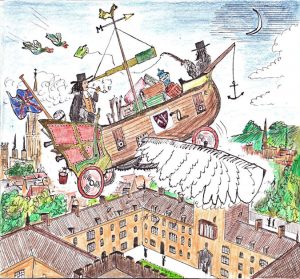 When people think of going into space, most of them think of the “Race to Space.” John F Kennedy (1917-1963) who served as the 35th President of the United States, was president during the Cuban Missile Crisis, the Civil Rights Movement, and the beginning of the United States involvement in the Vietnam War. The race to space was his pet project, but he was not the first person to think about it. I think you would be very surprised to find out who the first person to propose space travel.
When people think of going into space, most of them think of the “Race to Space.” John F Kennedy (1917-1963) who served as the 35th President of the United States, was president during the Cuban Missile Crisis, the Civil Rights Movement, and the beginning of the United States involvement in the Vietnam War. The race to space was his pet project, but he was not the first person to think about it. I think you would be very surprised to find out who the first person to propose space travel.
The first proposal for space travel in English history was made by Oliver Cromwell’s brother-in-law, John Wilkins 1614-1672) a theologian and natural philosopher, who married Cromwell’s youngest sister Robina. Wilkins was a polymath of great learning and curiosity, and would be one of the founders of the Royal Society. In two books he explored the possibility of “flying chariots” to carry men to the moon. He believed, as did many others, that the moon and planets were inhabited, and that we should meet these people and trade with them. People were anchored to the earth by a type of magnetism, and if it were possible to reach an altitude of just 20 miles, travellers would be free to fly, or rather sail, though space. Breathing wouldn’t be a problem as the astronauts would soon grow accustomed to the purer air breathed by angels. Of course, we now know that the problem with the “air” in space was the lack of it, not the purity of it.
Apparently, Wilkins experimented in building flying machines with Robert Hooke, in the gardens of Wadham  College, Oxford, in the 1650s. Some years later, however, with growing understanding of the nature of vacuums, he realised that space travel was much more complicated than he had first expected. I suppose it was a letdown in his philosophers mind, but the conclusion was inevitable, because as we all know space travel, while definitely possible, is not easy. It takes much scientific analysis and years of trial and error, but while it was not as easy as Wilkins thought it would be, he was on the right track after all. Nevertheless, Wilkins was not well known for his futuristic vision. While his Cromwellian connections reduced him to poverty after the return of the monarchy, Wilkins’s fortunes were gradually restored and he ended his life as Bishop of Chester.
College, Oxford, in the 1650s. Some years later, however, with growing understanding of the nature of vacuums, he realised that space travel was much more complicated than he had first expected. I suppose it was a letdown in his philosophers mind, but the conclusion was inevitable, because as we all know space travel, while definitely possible, is not easy. It takes much scientific analysis and years of trial and error, but while it was not as easy as Wilkins thought it would be, he was on the right track after all. Nevertheless, Wilkins was not well known for his futuristic vision. While his Cromwellian connections reduced him to poverty after the return of the monarchy, Wilkins’s fortunes were gradually restored and he ended his life as Bishop of Chester.


Leave a Reply